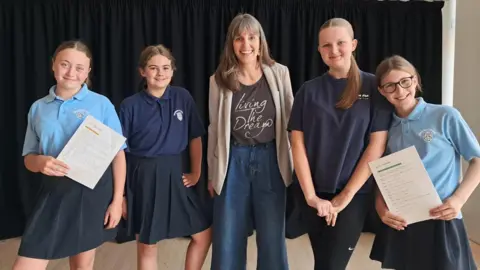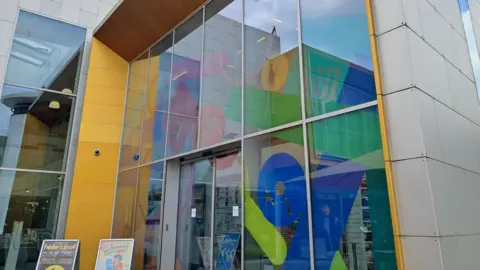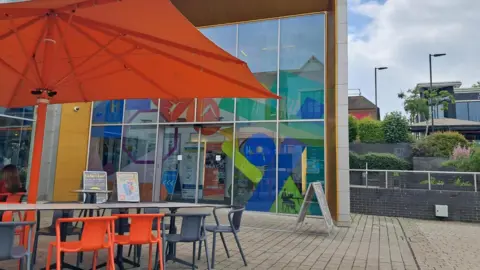How are theatres bouncing back from the pandemic?
 BBC
BBCIn an upstairs rehearsal room at the Cornerstone Arts Centre in Didcot, a group of teenagers are practising for an upcoming show.
It is a sign of the booming activity the venue has been enjoying recently.
Last autumn, audience numbers were up 70% on the year before and a new strategy from local authorities is promising a hefty investment in its building.
But the scene across Oxfordshire is not always as rosy, with funding and access to affordable arts spaces sometimes proving a sticking point.
The Covid pandemic was a tough time for arts venues.
They had to deal with closures, adapting to virtual performances and keeping on top of costs.
For places like Unicorn Theatre in Abingdon and the Kenton Theatre in Henley-on-Thames, this was made far harder by the high running costs of their old buildings.
"We had to pretty much shut down for over a year, and you've got to pay all the costs of running the building," said Greg Bensberg, chair of Abingdon Abbey Buildings Trust, which houses the Unicorn.
"We staggered on through there but Covid was really bad."
Lottie Pheasant, theatre manager at the Kenton, said the pandemic had nearly brought the venue to its knees.
"Two years ago, we were close to having to close," she said. "That year, we filed a nearly £190,000 loss."
The Kenton was saved by a £100,000 loan from Henley Town Council.
"It gave us the breathing space to reset things," Miss Pheasant said.
"We're in a much better position now. We've managed to reduce our losses down to £30,000 in a year, which is incredible.
"We're really hoping by the end of August this year to be nearly at break-even point."
But she said there should be more support for venues like the Kenton.
She said: "The reality is that, for all these smaller theatres, ticket sales alone are never going to cover running costs.
"Trying to look after buildings of this age, trying to look after running costs - I don't think people appreciate how much it costs just to open the theatre every day."

At Cornerstone, however, the mood is optimistic.
The venue has just been granted £405,000 from Community Infrastructure Levy funding to revamp its building.
"The building opened in 2008 and some parts are starting to show its age," community arts manager Daniel Harrison said.
"We're looking to completely revamp the cafe area, repurpose the box office and do some cosmetic improvements to the outside as well."
It is all part of South Oxfordshire District Council's upcoming Culture, Heritage and Creative Industries Strategy, run alongside Vale of White Horse District Council.
Starting in summer 2026 and lasting four years, the project will work with the Arts Council, the National Lottery Heritage Fund and others to give a boost to the creative sector.
Tourism, the local economy and arts jobs are all in its sights.
Georgina Heritage, the authority's communities lead, said, "The strategy will enable us to have a four-year plan and set the vision for arts and culture, not just at Cornerstone but across the district."
It would also emphasise the importance of the arts sector in south Oxfordshire "for businesses and the health and wellbeing of our residents," she added.

But for some arts groups, it can be a struggle to find affordable arts spaces to use.
Alison Jerred is in two amateur performance groups - Buttercross in Witney, and Kidlington Amateur Operatic Society.
Both have struggled to find places to put on their shows.
"The cost of hiring places to rehearse is increasing and it is hard to find those cost effective locations," she said.
As a result, the groups have ended up rehearsing in sitting rooms and making sets in garages.
It often means they do not get into the spaces they will be performing in until just before the shows.
For Ms Jerred, arts and culture bring a whole host of benefits to society, beyond just entertainment.
She said: "It's great for your mental health, the community, education and economic growth as well.
"And it brings joy for people. In the difficult times we had through Covid, people turned to theatre and music."
You can follow BBC Oxfordshire on Facebook, X (Twitter), or Instagram.
